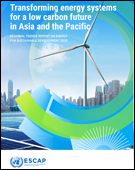 Transforming Energy Systems for a Low Carbon Future in Asia and the PacificThis report looks at the advancements and obstacles faced in the transition to a low-carbon energy future in Asia and the Pacific, and analyzes the region’s progress toward Sustainable Goal 7: Affordable and Clean Energy. The United Nations Economic and Social Commission for Asia and the Pacific (UNESCAP) has been backing initiatives that enhance regional power grid connectivity as regional and cross-border planning becomes more important. Initiatives such as the Greater Mekong Subregion, the South Asia Subregional Economic Cooperation, and the Economic Cooperation Organization aim to expand cross-border power infrastructure and electricity trade. These examples illustrate how multilateral cooperation strengthens energy security and help achieve common climate goals. Author: United Nations Economic and Social Commission for Asia and the Pacific Year: 2025 Download Tags: UNESCAP, Regional Cooperation, Energy, Cooperation, South Asia, Sustainable Development Goals Strengthening Regional Cooperation for Seamless and Sustainable ConnectivityLeast developed countries, landlocked developing countries, and small island developing states in Asia and the Pacific have been working to promote seamless transport to facilitate trade. Bangladesh, for example, has completed construction of the new Akhaura (Bangladesh) to Agartala (India) railway link, and has begun operations of Oxygen Express train carrying liquid medical oxygen as well as regular freight services between Haldibari in India and Chilahati in Bangladesh. Across South Asia, countries have also been rolling out an Electronic Cargo Tracking System under the United Nations Economic and Social Commission for Asia and the Pacific to make cargo movement more seamless. Author: United Nations Economic and Social Commission for Asia and the Pacific Year: 2023 Download Tags: Trade, South Asia, UNESCAP, Regional Cooperation, Sustainable Development Goals, Railway, Bangladesh, India Economic and Social Survey of Asia and the Pacific 2022: Economic Policies for an Inclusive Recovery and Development Rapid economic growth in Asia and the Pacific in the last three decades have lifted many out of poverty, through improvements in agriculture and manufacturing. Nevertheless, many countries have experienced increases in inequality in their countries since the 1990s. This publication argues that Asia-Pacific countries should prioritize inclusive growth, by allowing those from all socioeconomic groups to improve livelihoods, incomes, and education. While fiscal and health challenges posed by the coronavirus pandemic present challenges, achieving inclusive recovery is still very possible. Author: United Nations Economic and Social Commission for Asia and the Pacific Year: 2022 Download Tags: UNESCAP, COVID-19, Trade Infrastructure Financing for Sustainable Development in Asia and the PacificThis book proposes adopting a more holistic approach to help accelerate infrastructure development in Asia and the Pacific. It discuses project financing for Nepal’s cross-border dry ports, streamlining Nepal’s trade and transit procedures through Automated Systems for Customs Data (ASYCUDA) and Advanced Cargo Information System (ACIS), and project financing by the Asian Development Bank of the Kakarbhitta dry port and a cross-country corridor project between Bangladesh and India. Financing and technical assistance from multilateral development banks and neighboring countries not only bridge funding gaps, these also help countries learn from funders’ experience constructing and operating infrastructure assets. Author: United Nations Economic and Social Commission for Asia and the Pacific Year: 2019 Download Tags: Infrastructure, Nepal, Sustainable Development Goals, UNESCAP Asia-Pacific Trade and Investment Report 2018: Recent Trends and DevelopmentsThe Asia-Pacific Trade and Investment Report provides information and independent analyses of regional trends and policy developments in trade, goods, and commercial services. In 2018, the Asia-Pacific region increased its share of global merchandise trade. Intraregional and interregional trade also accelerated in Asia-Pacific. As trade among and with North, Central, and South Asia still involve high costs, more cooperation is needed on digitalization of trade processes. Author: United Nations Economic and Social Commission for Asia and the Pacific Year: 2018 Download Tags: South Asia, Trade Facilitation Agreement, WTO, SAARC, UNESCAP Embracing the E-commerce Revolution in Asia and the PacificAsia is the world’s largest e-commerce marketplace. In South Asia, India has the largest e-commerce market at $33 billion in 2017. Maldives, Bhutan, and Sri Lanka lead the subregion in terms of percentage of the population with access to the internet. This report introduces a framework for analyzing the quality of e-commerce development in the Asia-Pacific region and discusses lessons learned regarding e-commerce development. The framework incorporates economic factors, institutional environment, and social acceptance to assess e-commerce development and suggest the way forward. Author: Asian Development Bank, United Nations Economic and Social Commission for Asia and the Pacific Year: 2018 Download Tags: ADB, ICT, Trade, UNESCAP, Maldives, Bhutan, Sri Lanka Services and Global Value Chains: The Asia-Pacific Reality, Studies in Trade, Investment and Innovation 89This book reviews issues concerning the roles of services in global value chains. It presents a framework for assessing links among different services and between services and the manufacturing sector. The book explains the contribution of services to global value chains in the Asia-Pacific region and to the world and also draws lessons with which countries could understand the importance of services and participation in global value chains to achieving sustainable development. Author: Witada Anukoonwattaka, Mia Mikic, Yuhua Zhang Year: 2017 Download Tags: ASEAN, Asia-Pacific, Energy, Global Value Chains, India, Nepal, Regional Cooperation, Sri Lanka, Sustainable Development, Sustainable Development Goals, Trade Facilitation, UNESCAP Asia-Pacific Trade and Investment Report 2017: Channelling Trade and Investment into Sustainable DevelopmentThis report provides analyses of trends and policy developments in trade in goods and commercial services in Asia-Pacific. It shows that merchandise trade remained subdued in 2016, with South and Southwest Asia accounting for 8% of Asia-Pacific exports and 12% of Asia-Pacific imports. Foreign direct investments inflows In South and South-West Asia decreased slightly by 4% to $66 billion in 2016. The report also argues for targeted trade and investment policies that strike a balance between economic development and social and environmental development. Author: United Nations Economic and Social Commission for Asia and the Pacific Year: 2017 Download Tags: Trade, Investment, FDI, ASEAN, India, Services, South Asia, Sri Lanka, Sustainable Development Goals, UNESCAP 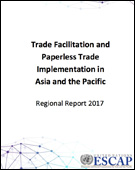 Trade Facilitation and Paperless Trade Implementation in Asia and the Pacific - Regional Report 2017Paperless trade reduces trade costs and enables trade to drive growth and sustainable development. This report shares results of the global survey on trade facilitation and paperless trade implementation, covering 44 countries in Asia and the Pacific. It covers 47 trade facilitation measures, including those involving general trade, paperless trade, cross-border paperless trade, transit, and trade for small and medium-sized enterprises. The report gives an overview of trade facilitation implementation in South and Southwest Asia, and includes Bangladesh, India, and Myanmar in its analysis of transit measures in Asia and the Pacific. Author: United Nations Economic and Social Commission for Asia and the Pacific Year: 2017 Download Tags: UNESCAP, Bangladesh, India, Least Developed Countries, Maldives, Myanmar, Small and Medium Enterprise, Trade Facilitation Agreement, Transport Facilitation, WTO ESCAP Newsletter - 2017 SeptemberThe ESCAP Newsletter is a monthly recap of the events and other activities of the United Nations Economic and Social Commission for Asia and the Pacific (UNESCAP). This issue highlights the ASEAN-India partnership and how it could benefit the Asia-Pacific region. Dr. Shamshad Akhtar, Executive Secretary, UNESCAP, talks about the importance of sustainable development and regional cooperation and integration. The issue also features a story on strengthening technical cooperation between UNESCAP and Myanmar. Author: United Nations Economic and Social Commission for Asia and the Pacific Year: 2017 Download Tags: ASEAN, India, Myanmar, Regional Cooperation, Regional Integration, UNESCAP 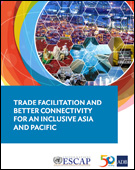 Trade Facilitation and Better Connectivity for an Inclusive Asia and PacificThis report investigates the evolution of trade costs, examines trade facilitation and paperless trade implementation, and highlights key initiatives in South Asia, including efforts by members of the South Asia Subregional Economic Cooperation (SASEC). The SASEC Trade Facilitation and Transport Working Group agreed to expand assistance to trade facilitation through technical assistance to support more efficient, transparent, secure, and service-oriented processing of cross-border trade across South Asia. Through 2025, the SASEC connectivity agenda will be better aligned with the frameworks of South Asian Association for Regional Cooperation and the Bengal Initiative for Multi-Sectoral Technical and Economic Cooperation. To help establish a trade and transport facilitation monitoring mechanism, Bangladesh, Bhutan, and Nepal conducted studies that reviewed trade and transport procedures, analyzed bottlenecks, and gave recommendations on trade and transport facilitation. Author: Asian Development Bank and United Nations Economic and Social Commission for Asia and the Pacific Year: 2017 Download Tags: ADB, Bangladesh, Bhutan, BIMSTEC, Maldives, Nepal, SAARC, India, Myanmar, SASEC, South Asia, Sri Lanka, Trade Facilitation, Transport, UNESCAP, ADB RCI 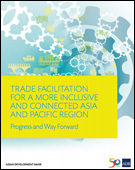 Trade Facilitation for a More Inclusive and Connected Asia and Pacific Region: Progress and Way ForwardThis report gives an overview of assessments from the 2017 global survey on trade facilitation and paperless trade in Asia and the Pacific. It looks at the implementation of trade facilitation and paperless trade measures in 44 countries in Asia and the Pacific, including how the South Asia Subregional Economic Cooperation Trade Facilitation Strategic Framework promotes development by deepening regional cooperation. The Framework covers national and subregional projects in Customs harmonization, improving cross-border facilities, and transport facilitation. The Framework also supports regulatory reforms and the development of the National Single Window Customs management system in Bangladesh, Bhutan, Maldives, and Nepal. Author: Asian Development Bank and United Nations Economic and Social Commission for Asia and the Pacific Year: 2017 Download Tags: ADB, Bangladesh, Bhutan, BIMSTEC, Maldives, Nepal, Regional Cooperation, Regional Integration, SAARC, SASEC, Standards Harmonization, Trade Facilitation, Trade Facilitation Agreement, WTO, UNESCAP, ADB RCI Regional Road Map for Implementing the 2030 Agenda for Sustainable Development in Asia and the PacificIn 2015, 150 countries set in motion the most ambitious development agenda of our time, the 2030 Agenda for Sustainable Development. Asian countries have begun translating this agenda into action through national plans and programs. However, to fully achieve the Sustainable Development Goals, countries need to examine opportunities for regional cooperation to complement the effectiveness of national mechanisms in the areas of finance, technology, capacity-building, and trade. Discussion through regional and subregional organizations can help facilitate cooperation in these key areas. Author: United Nations Economic and Social Commission for Asia and the Pacific Year: 2017 Download Tags: Regional Cooperation, SAARC, Sustainable Development Goals, Trade, UNESCAP Myanmar’s Engagement in Regional Integration: Status and Way Forward (AWP No. 169)Myanmar strategic position connects Asia’s three big markets—Association of Southeast Asian Nations, China, and India. Since 2011, Myanmar has laid down economic reforms that are unlocking the country’s potential. This working paper discusses Myanmar’s participation in regional partnerships, such as the South Asia Subregional Economic Cooperation, which it joined in 2017. It argues that such partnerships are essential in building Myanmar’s infrastructure and speeding up its growth. Author: Prabir De Year: 2017 Download Tags: ADB, ASEAN, India, Myanmar, Regional Cooperation, Regional Integration, SASEC, UNESCAP 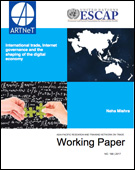 International Trade, Internet Governance and the Shaping of the Digital Economy (AWP No. 168)The connection between trade and internet governance presents complex policy challenges in today’s digital economy. This working paper highlights several observations and findings on the complex relationship between international trade and the internet. It recognizes the fact that the internet is not only driven by economic factors, but is a complex phenomenon shaped by political and social engagement, technical efficiency, and cultural and moral considerations. It sees the importance of synergizing international trade and the internet, and recommends that the World Trade Organization and other trade institutions develop mechanisms to consult internet governance institutions such as the Internet Engineering Task Force, World Web Wide Consortium, Internet Corporation for Assigned Names and Numbers, International Telecommunications Union, Internet Society, and the Internet Governance Forum. Author: Neha Mishra Year: 2017 Download Tags: ICT, Trade Facilitation, UNESCAP, WTO ESCAP Newsletter - June 2017The ESCAP Newsletter is a monthly recap of the key events, publications and other activities of the United Nations Economic and Social Commission for Asia and the Pacific (UNESCAP). It highlights the key issues that the UNESCAP works on and how the organization works to support member states in reaching the objectives of the Sustainable Development Goals (SDGs). This issue highlights the 73rd Commission Session of Asia-Pacific leaders on "Regional Cooperation for Sustainable Energy," which culminated with the adoption of resolutions advancing transport connectivity and sustainable energy development. Author: United Nations Economic and Social Commission for Asia and the Pacific Year: 2017 Download Tags: Energy, Regional Cooperation, UNESCAP, Sustainable Development, Sustainable Development Goals 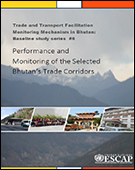 Performance and Monitoring of Selected Bhutan’s Trade CorridorsThis report on performance and monitoring of two corridors, the Kolkata-Phuentsholing corridor and the Burimari-Phuentsholing corridor is the sixth of a six-part study on Trade and Transport Facilitation Monitoring Mechanism (TTFMM) in Bhutan. The study finds that average speed along the corridor is very low. Along the Kolkata-Phuentsholing corridor, average speed with delays is 9 kilometers per hour (km/h) and without delays is 15 km/h. Along the Burimari-Phuentsholing corridor, average speed with delays is about 5 km/h and without delays is 16 km/h. The challenges to ensuring efficient transport along the corridor remain significant, yet the study sees tremendous opportunities for improvement, and raises the importance of continuous and effective monitoring to observe whether trade and transport performance along the corridor improve over time. Author: United Nations Economic and Social Commission for Asia and the Pacific Year: 2017 Download Tags: UNESCAP, Bhutan, Trade Facilitation, Transport Time Release Study in PhuentsholingThis Time Release Study report undertaken at Phuentsholing Land Border Crossing Station in Bhutan is the fifth of a six-part study on Trade and Transport Facilitation Monitoring Mechanism (TTFMM) in Bhutan. According to the study, the average time taken for clearance of import goods from India is 58 minutes for taxable goods and 28 minutes for non-taxable/exempted goods. Imports from third countries take around 16 hours for taxable goods and 7 hours for non-taxable/exempted goods. Export of goods to India and third countries follow the same procedure, with around 13 minutes on the average needed to clear export goods. Specific recommendations are given to further enhance the efficiency of clearance of goods at the borders, including conducting the TRS on a regular basis. Author: United Nations Economic and Social Commission for Asia and the Pacific Year: 2017 Download Tags: UNESCAP, Trade Facilitation, Bhutan Business Process Analysis of Import of Light Motor Vehicles from the Third Countries to Bhutan via Kolkata PortThis business process analysis report on the import of light motor vehicles (LMVs) from third countries to Bhutan via Kolkata Port is the first report of a series of a six-part study on Trade and Transport Facilitation Monitoring Mechanism (TTFMM) in Bhutan. Study findings reveal it takes 28.5 days to import LMVs from the Republic of Korea, with costs amounting to around $1,289 to complete the import procedures, not including the applicable duty and taxes payable in Bhutan. 39 documents are needed to complete the import process, with 12 documents requiring extra copies. Specific recommendations are given to improve trade in this commodity. Author: United Nations Economic and Social Commission for Asia and the Pacific Year: 2017 Download Tags: UNESCAP, Bhutan, Trade Facilitation, Transport Digital Trade Facilitation: Paperless Trade in Regional Trade AgreementsMost regional trade agreements now feature one or more measures for electronically exchanging trade-related information. These measures are becoming essential to maintaining trade competitiveness and enabling effective participation in cross-border e-commerce. This paper examines the extent to which measures enabling paperless trade are included in regional trade agreements (RTAs), such as the Association of Southeast Asian Nations-India Free Trade Agreement. India leads the region with the highest number of RTAs involving paperless trade measures. Asia-Pacific RTAs now increasingly cover specific areas of paperless trade such as electronic certificates of origin and sanitary and phytosanitary certificates. Author: Yann Duval and Kong Mengjing Year: 2017 Download Tags: ADB, ASEAN, Free Trade Agreements, India, Regional Cooperation, Trade Facilitation, UNESCAP, WTO Regional Cooperation for Sustainable Energy in Asia and the PacificCountries in the Asia-Pacific region face multiple energy-related challenges, which are driving transformation of energy systems. Addressing these energy challenges is an integral part of implementing the 2030 Agenda for Sustainable Development, including ensuring access to affordable, reliable, sustainable, and modern energy for all. This report analyzes challenges in the Asia-Pacific region and its efforts to accelerate the energy transition to achieve Sustainable Development Goal 7. Author: United Nations Economic and Social Commission for Asia and the Pacific Year: 2017 Download Tags: Asia-Pacific, Energy, Sustainability, Sustainable Development Goals, UNESCAP, Bangladesh, Bhutan, India, Maldives, Myanmar, Nepal, Sri Lanka Eradicating Poverty and Promoting Prosperity in a Changing Asia-PacificThis report explores five long-term trends in the Asia-Pacific region that will shape approaches to poverty alleviation and the prospects for achieving prosperity: regional economic cooperation and integration; rural–urban transitions; demographic changes; ICT access and connectivity; and demand for natural resources. It examines the changing development context in South Asian and other economies. It also looks at opportunities created by regional cooperation and integration that intend to bring about shared economic benefits. Author: United Nations Economic and Social Commission for Asia and the Pacific, Asian Development Bank, United Nations Development Programme Year: 2017 Download Tags: ADB, Connectivity, ICT, Regional Cooperation, Sustainability, UNESCAP, UNDP, Bangladesh, Bhutan, India, Maldives, Nepal, Sri Lanka 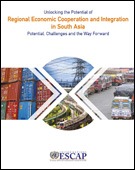 Unlocking the Potential of Regional Economic Cooperation and Integration in South AsiaAt a modest 6% of total trade, intraregional trade in South Asia stands at less than one third of its full potential. Trade barriers and inadequate infrastructure have cost South Asia over US $54 billion per year in lost export opportunities. With 309 million people living on less than $1.90 a day—the largest concentration of poverty in the world—South Asia should urgently pursue broad-based regional economic cooperation that could enable effective responses to the subregion’s developmental challenges. This report examines the state of economic integration in South Asia and identifies potential areas for further strengthening subregional linkages. It provides recommendations on policy actions to increase market integration, improve connectivity, boost investment in infrastructure development, and tackle shared vulnerabilities and risks. It calls for the consolidation and upgrading of existing trade and investment cooperation initiatives into a South Asia Comprehensive Economic Partnership. Author: United Nations Economic and Social Commission for Asia and the Pacific Year: 2017 Download Tags: BIMSTEC, Investment, Regional Cooperation, SAARC, South Asia, Sustainability, Sustainable Development, Trade, UNESCAP, Bangladesh, Bhutan, India, Maldives, Myanmar, Nepal, Sri Lanka 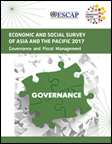 Economic and Social Survey of Asia and the Pacific 2017The 2017 edition of UNESCAP’s Economic and Social Survey of Asia and the Pacific underscores the need to better address the region's pressing challenges due to rising trade protectionism, heightened global uncertainty, and rapid growth in the previous years. Better governance and effective institutions can help Asia and the Pacific countries cope with steady but modest growth and rising inequalities, as well as environmental degradation, by helping them gain access to a skilled labor force, improve investment prospects, and sustain innovation—enhancing their level and pace of productivity, improving their long-term economic prospects. In South Asia, where most households depend entirely on labor income, decent and high-productivity jobs are needed to help mitigate high levels of poverty. The report also highlights the need to manage climate change, which threatens to undermine the region's economic development gains. Author: United Nations Economic and Social Commission for Asia and the Pacific Year: 2017 Download Tags: UNESCAP, South Asia, Trade Implications of Brexit to the Asia-Pacific Region: with a Focus on Least Developed Countries (Trade Insights: Issue No. 20)This issue of Trade Insights, published by United Nations Economic and Social Commission for Asia and the Pacific, discusses how possible Brexit scenarios could adversely affect least developed countries in the Asia-Pacific region. Simulation results show that potential reduction in exports to the United Kingdom for fish, clothes, textiles, footwear, and other key items can range from 16% to 50% of their current export value. According to the study, countries heavily exposed to Brexit-induced risks must analyze the extent of such impact and engage the United Kingdom in discussions in order to limit negative impact. Author: Louis Graham, Arun Jacob, and Anders K. Møller Year: 2017 Download Tags: Asia-Pacific, Least Developed Countries, South Asia, Trade, UNESCAP, India, Bangladesh, Maldives, Myanmar, Nepal, Sri Lanka 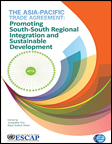 The Asia-Pacific Trade Agreement: Promoting South-South Regional Integration and Sustainable DevelopmentAs countries begin to depend on more each other, trade policy is helping achieve inclusive and sustainable development. Trade and investment are linked to the environment and social issues, and countries now realize that cooperation is necessary in approaching global and regional problems. The Asia-Pacific Trade Agreement (APTA), the oldest preferential trade agreement in the region, helps promote economic development and the adoption of mutually beneficial trade measures. This book gives an overview of the APTA and outlines potential benefits and challenges for members new to the APTA. The book details a possible road map for APTA and suggests that APTA move from the conventional preferential agreement to a comprehensive economic integration agreement by converting to FTAs in goods, services, investment, trade facilitation and non-tariff measures. Author: Joong-Wan Cho and Rajan Sudesh Ratna (editors) Year: 2017 Download Tags: Asia-Pacific Trade Agreement, Bangladesh, India, Sri Lanka, Regional Integration, Sustainability, UNESCAP Renewable Energy Sector in Emerging Asia: Development and Policies (TIID Working Paper No. 1/2017)Rapid economic growth in emerging Asia has led to a critical increase of greenhouse gas emissions. Transitioning to renewable energy sources would help reduce emissions. However, massive investment is needed to make that transition. According to this paper, targeted policy interventions are needed to facilitate trade and investment in the renewable energy sector and create “green jobs” in the low-carbon and resource-efficient sectors. Author: Masato Abe, Candice Lea Marie Branchoux, Jaewon Kim Year: 2017 Download Tags: Bangladesh, Energy, Governance, Hydropower, Employment, India, Myanmar, Sustainability, UNESCAP Towards a Sustainable Future: Energy Connectivity in Asia and the PacificDespite the benefits of energy connectivity, energy trade in Asia and the Pacific has remained far below its potential. This publication takes a detailed and engaging look at how smart region-wide energy connectivity could greatly improve energy supply and address the environmental impacts of energy. It maps existing energy connectivity in the region, examines ongoing initiatives, and suggests regional action plans that could lead Asia and the rest of the world to a sustainable future. Author: United Nations Economic and Social Commission for Asia and the Pacific Year: 2016 Download Tags: Asia-Pacific, Energy, Environment, Sustainability, Connectivity, UNESCAP 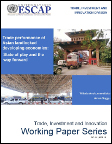 Trade Performance of Asian Landlocked Developing Economies: State of Play and the Way ForwardMany landlocked countries remain among the world's poorest nations, despite huge political, economic and technological gains over the last two centuries. Their lack of access to coast and sea ports burden them with higher trade costs, constraining their socio-economic development prospects. This paper examines the trade performance of Asian land-locked developing countries (LLDCs), including their export performance and export diversification, and attempts to identify factors affecting their performance, such as cost of trade and trade facilitation measures, which inhibit their integration into global and regional economies. Among LLDCs in South Asia, Bhutan incurs some of the highest trade costs and Nepal faces high cost in transport services. The paper finds persistent challenges to the growth of Asian LLDCs--trade barriers and trade restrictions, lack of infrastructure and poor trade facilitation performance-- and recommends reforms that could mitigate these continuing economic challenges. Author: Witada Anukoonwattaka and Aman Saggu Year: 2016 Download Tags: Landlocked Developing Countries, Exports, Trade, UNESCAP 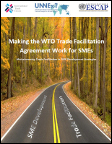 Making the WTO Trade Facilitation Agreement Work for SMEsSmall and Medium Enterprises (SMEs) comprise 95% of enterprises worldwide and provides at least two thirds of private sector employment. However, when it comes to international trade, SMEs experience limited capacity in dealing with the complex administrative and regulatory procedures associated with moving and selling goods across borders. This book fills a gap by providing a reference for articles of the World Trade Organization (WTO) Trade Facilitation Agreement (TFA) that are particularly beneficial to SMEs, and identifies examples of SME-specific programs, measures and interventions that can support the implementation of such provisions. It proposes mainstreaming relevant elements of the WTO TFA in existing SME policies and initiatives, to ensure that it contributes toward internationalization of SMEs.
Author: UNESCAP, UNNExT, and ITC Year: 2016 Download Tags: Small and Medium Enterprise, Trade Facilitation, Trade, UNESCAP, Small and Medium Enterprises, India, Nepal Information and Communication Technologies for Trade and Transport FacilitationInformation and Communication Technologies (ICT) provides efficiencies that can deliver many advantages for trade and transport facilitation (TTF) including Single Windows, automated business processes, digitalization of procedures, simpler interaction and transmission of data, and faster decision-making abilities. This paper looks at the business needs of TTF and explains the requirements of an architectural model to support TTF, with policy makers in mind. It highlights the need to integrate and modernize ICT systems and architecture so that ICT can respond to the needs of trade and transport facilitation. Author: UNESCAP and UNNExT Year: 2016 Download Tags: ICT, Trade Facilitation, Transport Facilitation, Single Window, UNESCAP 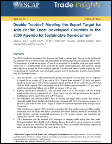 Double Trouble? Meeting the Export Target for Asia-Pacific Least Developed Countries in the 2030 Agenda for Sustainable Development (Trade Insights: Issue No. 15)This paper evaluates the prospects of least developed countries (LDCs) in Asia-Pacific in meeting the target set for LDCs to double their share of global exports by 2020, in Goal 17 of the Sustainable Development Goals (SDG). The paper notes that most Asia-Pacific LDCs have reported strong GDP growth turnout in recent years and are expected to grow by an average of 5.8% in 2016; difficulties faced by individual LDCs vary – Nepal, as an example, would need expansion at the average rate of 19% per year; LDCs can use national SDG strategies and go for longer-term goals—beyond the goals of export expansion—such as aiming to reach targets on trade cost reductions and trade facilitation. Author: Adam Heal, Miso Kim, Juliette Perche, Rajan Sudesh Ratna, and Pakkaporn Visetsilpanon Year: 2016 Download Tags: Least Developed Countries, Exports, Trade Facilitation, Trade, UNESCAP 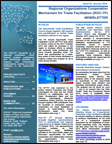 Regional Organizations Cooperation Mechanism for Trade Facilitation, Issue IX, January 2016This biannual publication features updates, publications and forthcoming activities of regional and international organizations working on trade facilitation in the Asia-Pacific region, including the Asian Development Bank (ADB), the World Customs Organization (WCO), and the United Nations Economic and Social Commission for Asia and the Pacific. It includes highlights of the Asia Pacific Trade Facilitation Forum 2015 and the Train-the-Trainer Workshops on Customs Valuation through Post Clearance Audit being jointly implemented by the WCO and ADB in the 6 SASEC member countries. This issue also features an analysis on achieving seamless supply chains through implementing comprehensive and pragmatic national trade facilitation reform programs. Author: UNESCAP Year: 2016 Download Tags: Trade Facilitation, Asia-Pacific, WCO, ADB, UNESCAP, Customs Valuation, Nepal, Bangladesh, Bhutan, India, Maldives, Sri Lanka 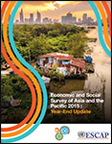 Economic and Social Survey of Asia and the Pacific 2015: Year-end UpdateThis year-end update revises economic growth in developing economies in Asia and the Pacific to 4.5% in 2015, from earlier projections of 4.9%, and updates the economic growth forecast for 2016 to 5%, from 5.2%. In most developing economies, including South and South West Asia, private consumption will lead to a slight pick-up in economic growth in 2016, amid gradual fiscal tightening and weak exports. With less robust growth compared to the years before and immediately after the global financial and economic crisis that started in 2008, the report highlights a need to tap into domestic and regional sources of demand—alternatives to dependence on external demand—including boosting investment in infrastructure, small and medium-sized enterprises, and the agricultural sector. Promotion of labor participation among the youth and the female population in South and South West Asia is also encouraged, since evidence has shown that improving their job opportunities matters for economic growth. Author: UNESCAP Year: 2016 Download Tags: Economic Growth, Gender, Infrastructure, UNESCAP 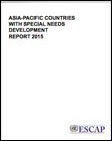 Asia-Pacific Countries with Special Needs Development Report 2015In the Asia-Pacific region, 36 out of the 58 economies are considered countries with special needs (CSN), which include least developed countries (LDC), landlocked developing countries, and small island developing States. This report highlights important areas that should be addressed as key priorities by CSNs such as economic diversification, external trade, South-South cooperation, and official development assistance including foreign direct investment. Bhutan and Nepal met the criteria for graduation from LDC status as of 2013. Other countries such as Bangladesh have a good chance of meeting the graduation criteria by 2018. Among the Small island developing States, Maldives is considered a success story in broadband internet connectivity. The results of this research show that Asia-Pacific CSNs must choose their paths to diversification carefully, depending on country circumstances. Author: United Nations Economic and Social Commission for Asia and the Pacific Year: 2015 Download Tags: Asia-Pacific, Least Developed Countries, Small Island Developing States, Bangladesh, Bhutan, Energy, FDI, Investment, Maldives, Nepal, Trade, Transport, UNESCAP Economic and Social Survey for Asia and the Pacific: Part 2 – Balancing the Three Dimensions of Sustainable Development: From Integration to Implementation This theme study outlines a conceptual framework, a set of strategies and policy options, and offers perspectives on institutional frameworks for integrating the three dimensions of sustainable development – economic growth, social progress and environmental protection. Regional cooperation is critical in maximizing opportunities for building synergies between the three dimensions. Initiatives at the regional level should consider establishing a regional road map, supporting regional economic integration initiatives, and strengthening regional platforms, including the United Nations and the multilateral system. Author: United Nations Economic and Social Commission for Asia and the Pacific Year: 2015 Download Tags: Asia-Pacific, Economic Integration, Regional Cooperation, Economic Growth, Environment, Sustainability, UNESCAP Outward FDI by Indian Manufacturing MNEs: Impacts and Implications This Asia-Pacific Research and Training Network on Trade Working Paper investigates the home country effects of outward foreign direct investment (OFDI) on domestic activity of Indian multinational enterprises (MNEs). The empirical evidence suggests that OFDI by Indian MNEs has a positive impact on export intensity and research and development. In order to derive desired complementary benefits of OFDI by manufacturing firms, policies may be directed to enhance the country’s international supply chain connectivity for greater participation in global value chain and production network. Author: Khanindra Ch. Das Year: 2015 Download Tags: India, FDI, Global Value Chains, Trade, Export, Development, Manufacturing, UNESCAP Trade and Non-Tariff Measures: Impacts in the Asia-Pacific Region This study brings together existing evidence on the occurrence and trade impacts of non-tariff measures (NTMs) in the Asia-Pacific region. It aims to contribute to an improved understanding on their trade impacts on developing countries. The report focuses on the consequences of NTMs for developing economies and South-South trade. The chapters include an overview of tariff and non-tariff measures, an evaluation of NTMs and trade, and an examination of Sanitary and Phytosanitary Measures and Technical Barriers to Trade. Finally, the study concludes by reviewing mechanisms for streamlining NTMs and promoting developing countries’ trade, particularly at the regional level. Author: United Nations Economic and Social Commission for Asia and the Pacific Year: 2015 Download Tags: Asia-Pacific, Tariff, Trade, Sanitary and Phytosanitary Measures, Technical Barriers to Trade, UNESCAP 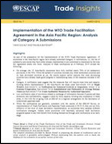 Implementation of the WTO Trade Facilitation Agreement in the Asia-Pacific Region: Analysis of Category A SubmissionsWorld Trade Organization (WTO) Trade Facilitation Agreement (TFA) provisions notified under Category A are those that WTO Member States have already implemented or have committed to implement by the time the Agreement enters into force or, in the case of the least-developed countries (LDCs), within a year of its entry into force. Provisions not included under this category are those which will require capacity building and technical assistance, or presumably take longer to implement. This trade insight paper analyzes Category A notifications of 15 economies in the Asia-Pacific region, contrasting the results with findings from an earlier ESCAP Survey on Implementation of Trade Facilitation and Paperless Trade (SITFAP) 2013/14 in order to examine some of the most challenging WTO TFA provisions, and gain insights on regional priorities for cooperation and capacity building. Author: Yann Duval and Pamela Bayona Year: 2015 Download Tags: Trade Facilitation, WTO, Least Developed Countries, UNESCAP Regional Transit Agreement in South Asia: An Empirical InvestigationThis discussion paper published by the South Asia Watch on Trade, Economics and Environment assesses the potential gains of a sub-regional transit arrangement and the removal of other border-trade barriers, particularly the eastern South Asia sub-region (Bangladesh, Bhutan, India and Nepal). It also discusses the link between transit and trade flows, provides profiles of intra-regional transit trade and current transit arrangements in South Asia, and identifies efficient regional transit corridors using linear programming or the Data Envelopment Analysis model. Author: Prabir De and Arvind Kumar Year: 2014 Download Tags: South Asia, Trade, Transport, Economics, Economic Corridor, SASEC, SAARC, UNESCAP, Customs, Harmonisation, Bangladesh, Bhutan, India, Nepal, Maldives, Sri Lanka Bridging Transport, ICT, and Energy Infrastructure Gaps for Seamless Regional ConnectivityThis publication is a contribution by the United Nations Economic and Social Commission for Asia and the Pacific to deliberations at the Second United Nations Conference on Landlocked Developing Countries (LLDCs) in Vienna, Austria, 3-5 November 2014. It shows regional connectivity as an unfinished agenda and bridging infrastructure gaps as a complex challenge for LLDCs. While physical infrastructure is a priority, this report argues that deeper regional integration – through regionally cohesive and terrestrial networks – is key to effectively linking Asian LLDCs to the region’s infrastructure networks. Author: United Nations Economic and Social Commission for Asia and the Pacific Year: 2014 Download Tags: Transport, ICT, Energy, UNESCAP, SASEC, Connectivity, Infrastructure, Bangladesh, India, Nepal, Sri Lanka, Trade, Trade Facilitation, Policy, Trade Policy Impact of Trade Facilitation on Foreign Direct InvestmentThis United Nations Economic and Social Commission for Asia and the Pacific Trade and Investment Working Paper attempts to quantify the potential impact of trade facilitation on foreign direct investment (FDI) flows. The study uses bilateral FDI data from 2006 onward from both developing and developed countries, including South-South FDI flows, wherein contiguity (common border between source and host country) and geographic distance are found to be much more important factors. In applying an augmented FDI model framework to determine the effect of comprehensive international trade costs, the results show that both non-tariff and tariff costs are important determinants of FDI inflows. Author: Yann Duval and Chorthip Utoktham Year: 2014 Download Tags: FDI, Trade Facilitation, Bilateral Trade, UNESCAP, Investment, Tariff, Bangladesh, Maldives Economic and Social Survey of Asia and the Pacific 2014This 2014 edition of UNESCAP's flagship publication emphasizes the importance of furthering regional connectivity in Asia-Pacific—a region which, despite significant reductions in poverty levels, is now witnessing rising income inequality, both within and between countries. It calls for driving the region's growth by exploiting the interdependence and synergies of five elements: trade and transport connectivity, ICT networks, energy connectivity, people-to-people networks, and promotion of knowledge-based economies, and advocates approaching connectivity as a regional public good. Author: UNESCAP Year: 2014 Download Tags: Economic Integration, Regional Cooperation, Poverty Reduction, Asia-Pacific, Connectivity, Energy, ICT, Bangladesh, Bhutan, India, Maldives, Sri Lanka, Trade, Transport, UNESCAP 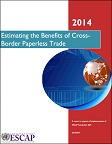 Estimating the Benefits of Cross-Border Paperless TradeCross-border paperless trade is trade that occurs on the basis of electronic communications and has been part of customs reform efforts in a variety of countries. Increased implementation of cross-border paperless trade is high on the trade facilitation agenda in Asia-Pacific. This report considers six measures to calculate estimates of possible economic benefits of cross-border paperless trade through counterfactual simulations using 2013 data and simple econometric models. Simulation results reveal that this new generation of trade facilitation can significantly reduce trade costs and boost intra- and extra-regional trade in the region. Partial implementation of these measures can lead to an export increase of $36 billion annually. Total direct cost savings across all trade is about $1 billion per annum for partial reform, and $7 billion for full implementation. Author: United Nations Economic and Social Commission for Asia and the Pacific Year: 2014 Download Tags: Trade Facilitation, Trade, Asia-Pacific, UNESCAP, Customs, Export, Bangladesh, Bhutan, India, Maldives, Nepal, Sri Lanka Trade Facilitation and Paperless Trade ImplementationThis paper reports survey findings on progress in implementing various trade facilitation and paperless trade measures made by 29 countries in Asia and the Pacific, including six SASEC member countries. Factors considered include pre-arrival clearance, post-clearance audit, National Single Window, and authorized operator programmes. The survey reveals that while countries have prioritized automation and paperless trade at the regional level, there is an urgent need for regional arrangements that will facilitate cross-border exchange of trade-related electronic documents and information to enable smoother trade facilitation. Author: Tengfei Wang and Yann Duval Year: 2014 Download Tags: Trade Facilitation, Regional Cooperation, Trade, Asia-Pacific, SASEC, Single Window, UNESCAP, Customs, Bangladesh, Bhutan, India, Maldives, Nepal, Sri Lanka 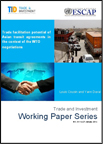 Trade Facilitation Potential of Asian Transit Agreements in the Context of the WTO NegotiationsFreedom of transit is an issue critical to landlocked developing countries whose lack of direct access to the sea has increased costs and lessened their competitiveness in international trade. To meet challenges arising from transit barriers, member states of the United Nations Economic and Social Commission for Asia and the Pacific recommend transit facilitation as part of an integrated approach to trade facilitation.
This working paper analyzes freedom of transit and transit facilitation in the context of trade and transport agreements in the Asia Pacific region, identifying good practices and weighing in on the extent to which existing agreements meet the provisions on transit facilitation stated in the draft text of the World Trade Organization Agreement on Trade Facilitation. Author: Louis Cousin and Yann Duval Year: 2014 Download Tags: Transport Facilitation, Trade Facilitation, WTO, Asia, UNESCAP, Bangladesh, Bhutan, India, Nepal |




